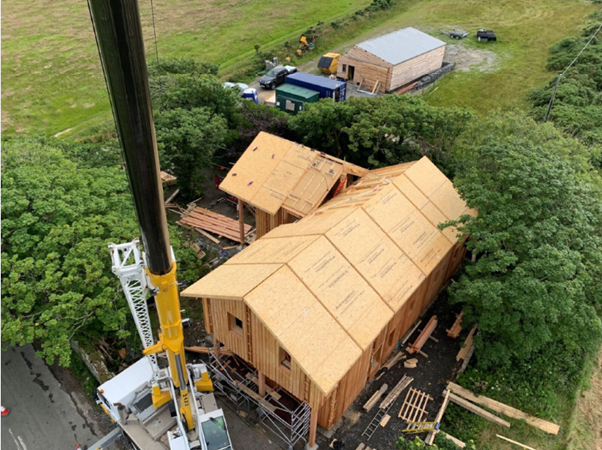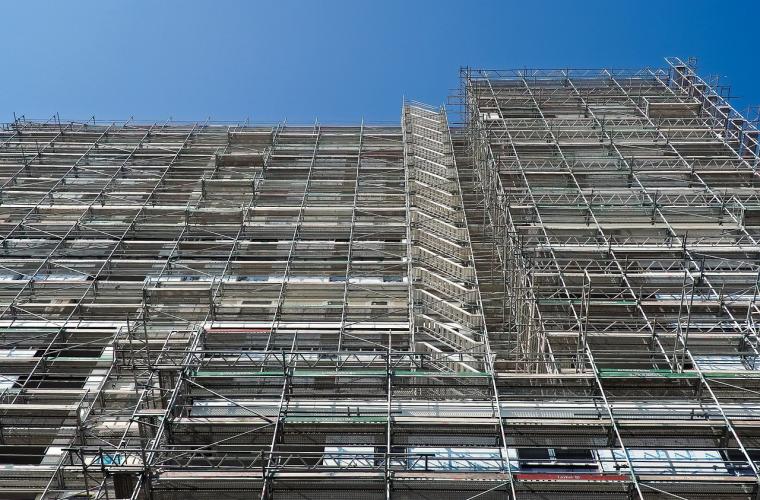UK construction companies recorded another growth slowdown in July, reflecting lower volumes of commercial building and a softer expansion of housing activity.
The latest survey also revealed a reduction in new business volumes for the first time since August 2016, which acted as a headwind to job creation and input buying across the construction sector.
At the same time, intense supply chain pressures continued in July and prices for construction materials increased at one of the sharpest rates since the first half of 2011.
Adjusted for seasonal influences, the IHS Markit/CIPS UK Construction Purchasing Managers’ Index (PMI) dropped from 54.8 in June to 51.9 in July, to signal the weakest construction performance since August 2016. The latest reading was below the long-run survey average (54.5) and pointed to only a moderate pace of business activity growth.

Lower levels of commercial construction were a key factor holding back overall business activity growth in July. Although only modest, the reduction in commercial activity was the fastest for 12 months. A number of survey respondents cited delays in decision making by clients, linked to worries about the economic outlook and heightened political uncertainty.
Residential building remained the strongest performing category of activity in July, although the latest rise was the slowest for three months. The only upturn in output growth was recorded in the civil engineering sector.
Construction firms commented on greater reluctance to commit to new projects among clients in July. Weaker demand led to an overall reduction in new business volumes for the first time since the postreferendum rebound began in September 2016. Deteriorating order books resulted in more cautious staff recruitment policies, as highlighted by a moderation in employment growth to its slowest for 11 months. Sub-contractor usage also decreased during the latest survey period.
July data suggested that UK construction companies responded to lower sales by tightening up purchasing activity at their business units. The latest increase in input buying was only marginal and the weakest since March. Delivery times for construction materials continued to lengthen sharply, which survey respondents linked to low stocks and stretched capacity among suppliers. Meanwhile, input cost inflation remained elevated and close to the peaks seen at the start of 2017, which was partly linked to prices for imported items.
Construction firms remained upbeat about their growth prospects, but the degree of optimism was the lowest since July 2016. This was attributed to heightened economic uncertainty and subdued confidence among clients.
Tim Moore, Associate Director at IHS Markit and author of the IHS Markit/CIPS Construction PMI, said: “July data reveals a growth slowdown in the UK construction sector, mainly driven by lower volumes of commercial development and a loss of momentum for house building. Weaker contributions from the cyclically sensitive areas of construction activity more than offset resilience in the civil engineering sector.
“Worries about the economic outlook and heightened political uncertainty were key factors contributing to subdued demand. Construction firms reported that clients were more reluctant to spend and had opted to take longer in committing to new projects.
“There was a knock-on impact for job creation and input buying following the largest downturn in order books since August 2016. However, supply chain pressures remained intense, reflecting low stocks among vendors, and materials prices continued to rise at one of the fastest rates seen for six years.
“The combination of weaker order books and sharply rising construction costs gives concern that an extended soft patch for the construction sector may be on the horizon.”
Sarah McMonagle, Director of External Affairs at the Federation of Master Builders (FMB), said: “These figures represent the weakest monthly performance in the UK construction industry for almost one year.
"Construction companies are suffering from ever-increasing costs and this is starting to act as a drag on growth. More specifically, the increase in construction material prices and higher wages and salaries due to the construction skills shortages will no doubt have contributed to these disappointing results.
"The commercial sector in particular fell at its fastest pace for 12 months but we also saw a loss of pace among house builders. However, although the construction sector is growing at a slower pace, it is still growing and therefore there is no reason to panic.”




















